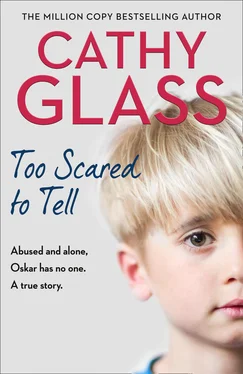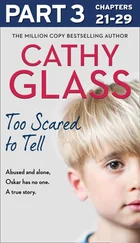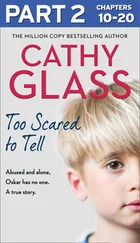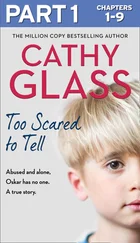He didn’t reply.
‘Oskar’s PE kit and book bag are in the classroom,’ Miss Jordan said. ‘I didn’t bother you with them yesterday.’ I nodded. ‘We like the PE kit to be taken home and washed once a week, and the book bag goes home with the child every afternoon so they can read a little.’ This was usual for a primary school.
‘Where should I wait for Oskar at the end of school?’ I asked.
‘In the front playground, where you came in,’ Miss Jordan replied. ‘The teachers bring out their classes. In the morning the children come in from the same place.’ Again, this wasn’t dissimilar to other schools. ‘As there is only five minutes before the start of school, Oskar can come with me for now and wait in my classroom,’ Miss Jordan offered.
‘Thank you.’
I said goodbye to Oskar and told him I would meet him at the end of school in the playground.
‘Am I going home with you again?’ he asked. I was reminded of just how confusing it is for a child to come into foster care.
‘Yes, love. You will be staying with me for a while. Have a good day and I’ll see you when school finishes.’
Oskar went with Miss Jordan, while I picked up the bag and left the building. I would see what clothes had been sent for Oskar before I bought a new school uniform or casual clothes. It’s preferable for the child if they can wear what they are used to, as it’s familiar and comforting.
With only five minutes to go before the start of school, the playground had filled with parents, carers and their children. As I made my way towards the main gate with the cumbersome laundry bag bumping against my leg, I heard a shout of, ‘Cathy!’
I turned and there was Angela, another foster carer I knew from attending foster-carer training and support groups. I set down the bag and we hugged and then had a chat. She was fostering a brother and sister who attended the school and who she said should be going home to their mother before too long, which was good. It wasn’t a huge coincidence that I’d bumped into a fellow foster carer. Having been fostering for over twenty-five years in the same area, I knew many foster carers and I had, at one time or another, stood in most school playgrounds in the county. It’s always nice to see a familiar face.
When the klaxon sounded for the start of school, we said goodbye and I picked up the bag and continued out of the school gates. As I did, my gaze fell on a car parked on the opposite side of the road. I was sure it was the same black car with two men in it that I’d seen the afternoon before. Whether it had been there when Oskar and I had come into school I didn’t know; I’d been looking in the opposite direction, towards the school. They were both looking at me. I continued to my car and, once in, I pressed the central locking system. I doubted they were parents, as they would have been in the playground seeing in their children. Perhaps one of them was Mr Nowak, who had dropped off Oskar’s belongings.
I started the car and pulled away, and the black car headed off in the opposite direction. If they were there again this afternoon, I would ask Miss Jordan or the school secretary if they knew who they were. Children in care are sometimes snatched by a family member from outside their school, and foster carers are advised not to put up a struggle and risk being hurt, but to let the child go and immediately call the social services and the police. Thankfully it doesn’t happen often, and it had never happened to me. But, of course, there is always a first time, so I needed to stay alert to protect Oskar.
Chapter Four
I arrived home still slightly unsettled from seeing the men waiting outside school. Had Oskar not recognized them the day before and then denied knowing them it probably wouldn’t have played on my mind, but he had recognized them – I was sure of it. However, aware I was likely to have a busy day, I thought it wise to unpack Oskar’s bag straight away. The first few days after a new child arrives are usually very busy and I was expecting to be spending a lot of time on the phone. I heaved the bag upstairs, along the landing and into Oskar’s bedroom. It was a fine spring day outside and the sun streamed through his bedroom window. I opened it a little and then unzipped the bag and began sorting through it.
It looked to me as though whoever had packed the bag had just grabbed whatever clothes of Oskar’s had come to hand. Some of them needed washing and I put those to one side, others had been washed but not ironed. There was a pair of pyjamas that looked too small for Oskar, a pair of grey school trousers, well-worn blue joggers, various socks (which I paired), some underpants, a vest, a zip-up jacket, new trainers and an old bath towel. There were also four small plastic toy cars. All in all, it was a meagre and rather sad selection, but I set about putting the clean clothes in his drawers and the toy cars on a shelf in his room. There is a great temptation as a foster carer – wanting the best for the child – to discard old possessions and replace them all with new. I would be buying Oskar plenty of new clothes (and toys), but I wouldn’t be getting rid of his old things. These would be a poignant reminder of – and link to – home, and also legally they belonged to his mother.
Having put away the clean clothes and the bag they came in, I scooped up the items that needed washing and took them downstairs, where I put them in the washer-dryer with the rest of the laundry. Not a moment too soon, for as the machine began its cycle the landline rang. I answered it in the kitchen and it was Andrew, Oskar’s social worker.
‘Good morning. What sort of night did Oskar have?’ he asked.
‘Good. No tears. He slept well. Although it appears he’s used to sleeping with his mother and some other women. I don’t know who they are. He gave me some names but said they weren’t his sisters, cousins or friends.’
‘How many women?’
‘He mentioned three. I wrote their names in my log; shall I fetch it?’
‘Not now. I’ll know more when I’ve spoken to his mother, but from what Mr Nowak told me yesterday it seems they live in a multiple-occupancy house and share childcare.’
‘That would make sense,’ I said. ‘Although Oskar was very vague about them. He didn’t say much. I got the feeling they weren’t close. But he had a good dinner and breakfast,’ I continued. ‘And is now in school.’
‘Yes, I’ve just spoken to the Head. I understand Mr Nowak brought in some of Oskar’s belongings.’ Schools and social services work closely together in matters of child protection.
‘Yes, I’ve unpacked them,’ I said. ‘There are some clothes and a few toy cars, but I’ll need to buy more and also another school uniform.’
‘OK.’ I assumed Andrew was making some notes. ‘Any behaviour issues?’ he asked.
‘Not so far, although it’s early days. Oskar is very quiet and withdrawn at present, but not upset. He didn’t want a bath or shower last night, and I didn’t insist.’ This point wasn’t just about hygiene; it meant I hadn’t had a chance to check Oskar to see if he had any injuries apart from the bruise on his cheek.
‘I’m going to arrange a medical for him, hopefully for later today,’ Andrew said. It’s usual for a child to have a medical when they first come into care, but it can sometimes take a few days to organize. ‘Oskar’s mother is still abroad, but I’ve left a message on her voicemail to phone me. Has Oskar said any more about how he got the bruise on his cheek?’
‘No.’
‘Are there any other injuries you can see?’
‘No. But I haven’t seen him undressed. He wanted to sleep in his clothes to begin with. I persuaded him to change, but I had to wait outside his bedroom door while he did so.’
Читать дальше












